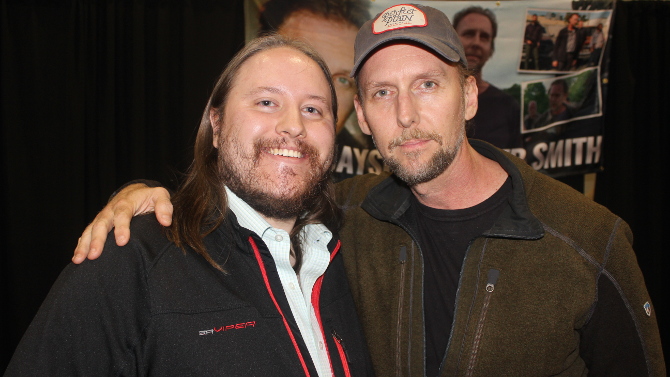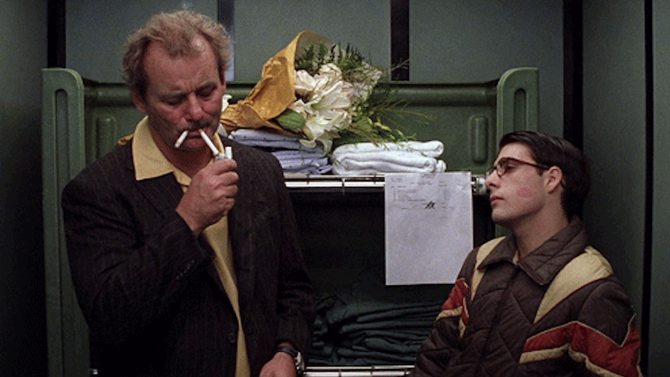I was fortunate enough to sit down with actor Jayson Warner Smith at CAPE (Cornwall and Area Pop Event) recently. Perhaps best known as Gavin, Negan’s trusted and rather level-headed manager of the Kingdom in The Walking Dead, he has quickly carved out several quality roles on both television and the silver screen in a short time.
Also with a key role on the highly acclaimed series Rectify (which ran for four seasons and ended in 2016), his character of Wendall Jelks is a master antagonizer and death row inmate, while he takes a wholly different turn as a loyal yet wild right-hand man airplane pilot to Tom Cruise’s character in 2017’s American Made (directed by Doug Liman). He has also appeared on the big screen in films such as Footloose (the remake), Mississippi Grind, Christine, and Birth of a Nation.
When the conversation turned to his favourite film, Smith immediately pointed to Wes Anderson’s Rushmore as being at the top of his list. Secretly wanting to be Jason Schwartzman’s character, he says he loves the film and could watch it over and over again. Make sure to check out the interview below to hear more on his love of Wes Anderson (and Rushmore), as well as learn some fascinating onset stories from The Walking Dead and American Made.
Wes Anderson’s 1998 film Rushmore, which he wrote with Owen Wilson, follows a smart yet eccentric teen named Max Fischer (Jason Schwartzman – a regular collaborator of Anderson’s), who is the extracurricular king of the posh Rushmore Preparatory School. The spectacled, neatly coifed young man is involved in everything at the academy, from being a playwright and president of the beekeeping club, to an alternate in wrestling and a fencing team member, which has caused his grades to fall and has placed him in the precarious position of being on academic probation. Whilst on his journeys, he befriends the much older Herman Blume (Bill Murray – who also collaborates regularly with Anderson), whose rather immature and moronic twin sons go to school with Max. The dissatisfied middle-aged man is drawn to Max’s ‘togetherness’, while the teen is fascinated by his self-made millions – two very different peas in the same pod (both seeing the other as successful for wholly different reasons). The mature-leaning Max soon begins to fall for primary teacher Rosemary Cross (Olivia Williams), who lost her husband a year earlier. To further complicate the young man’s life, his new friend Blume is also ‘hot for teacher’.
Max is eventually expelled by the headmaster, Dr. Nelson Guggenheim (Brian Cox) and has to go to the very ordinary Grover Cleveland High. Also, Max and Blume begin a long distance feud over the woman. What starts with letters and a cleverly staged bee attack, quickly escalates, prompting Blume to run over Max’s bike, and, in retaliation, Max cuts Blume’s car brakes – leading to his arrest. He becomes quite depressed, dropping all extracurricular activities and soon stops attending school – deciding to follow in his father’s unexciting footsteps and become his apprentice barber. Eventually, as things usually do in movies such as this, the two unusual friends make peace and Max gets back on the right track. He writes a brilliant play on the Vietnam War and sneakily works to get Blume and Ms. Cross back together.
As we have come to expect from Wes Anderson, his films have a very unique, visual aesthetic (and this one, only his second feature, is no different) – it is, simply put, stunning. His thought process is evident in every frame, always making for unusual and brilliantly orchestrated shots – his original use of symmetry, bird’s-eye view, slow motion, deliberately chosen angles, and tracking shots (to name but a few of his trademarks) are on full display. Yet, it also has a more raw, realistic feel – a burgeoning filmmaker growing in front of our very eyes. We would witness these trademarks grow and expand with bigger budgets, more intricate sets (this is shot on location – the high school is actually Anderson’s own St. John’s in Houston, Texas), and more experience . . . you will also notice that Rushmore is broken up thematically by months (a tool he would continue to use frequently throughout the years (think The Royal Tenenbaums and The Life Aquatic with Steve Zissou), so, in other words, there are strong roots that extend into his future features.
The music must also be mentioned. There is a barrage of excellent sixties tunes, with well known artists such as The Who, The Rolling Stones, The Kinks, Cat Stevens, John Lennon, The Faces and Donovan leading the way. Yet, there is also some great music from bands that have been lost to time, such as The Creation and Unit 4 + 2, who had one major hit with “Concrete and Clay”. It is an excellent soundtrack that feels right for the tone and themes of the movie.
The performances are also solid. Each of the actors are up to the task, easily handling Anderson’s distinct dialogue, while the main triumvirate develop seemingly together and successful characters that are, in all actuality, truly lonely and isolated, searching for meaning and appreciation in their respective lives from others (though, that in itself may be flawed, as only we can help ourselves). Schwartzman’s first film, it helped thrust him onto the scene, while Murray is, as usual, fantastic, bringing a quirky, eccentric character to life (he has made a great career out of creating these types of personas – be it in numerous other Anderson films or in flicks like Caddyshack or more recently in St. Vincent). Williams is strong as the woman who is still dealing with a fractured soul after the death of her husband and Cox is entertaining as always in his take on the headmaster. Smaller roles from Luke Wilson, as Dr. Peter Flynn, and Mason Gamble, who plays Max’s much younger sidekick Dirk Calloway, are just as special. The roller coaster ride of a story that Max and Dirk have is especially memorable, as things turn sour for awhile but Dirk is able to help wake Max from his depression and set him on the proper course in restoring his friendship with Blume and righting the ship that is his life.
Rushmore is the movie that helped propel Anderson into fame and he has never looked back. He has continued to make unusual, eccentric and entertaining comedies that are well received – movie and television aficionados will likely draw some comparisons to Harold and Maude and Charlie Brown. Perhaps this film holds the secret to happiness – when Blume asks Max how he has got things figured out, he explains that: “The secret, I don’t know. . . I guess you’ve just gotta find something you love to do and then. . . do it for the rest of your life.” Great advice from a great movie.



